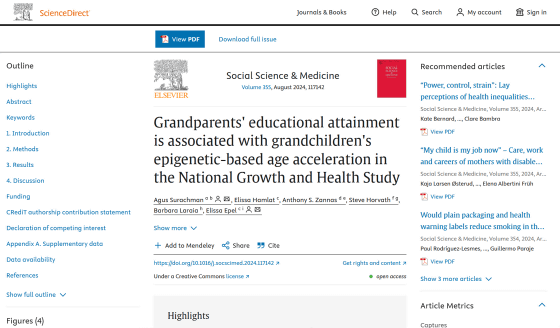Research results show that 'grandparents' educational background' is related to biological age

Biological age is different from chronological age, which is calculated based on the date of birth, and is calculated based on the aging of the body's cells and tissues. It is said to reflect bodily functions and disease risk more accurately than chronological age. A research team from
Grandparents' educational attainment is associated with grandchildren's epigenetic-based age acceleration in the National Growth and Health Study - ScienceDirect
https://www.sciencedirect.com/science/article/pii/S0277953624005951

Looking for Clues About Your Real Age? Your Grandparents' Education May Offer Some Insight.
https://drexel.edu/news/archive/2024/August/Looking-for-Clues-About-Your-Real-Age
Your Biological Age Has A Surprising Link to Your Grandparents' Education : ScienceAlert
https://www.sciencealert.com/your-biological-age-has-a-surprising-link-to-your-grandparents-education
When animals are exposed to various stresses, processes such as DNA methylation occur, in which methyl groups are added to bases in the DNA of cells. By measuring DNA methylation, it is possible to calculate biological age, which is useful for estimating lifespan and risk of chronic diseases .
Previous studies have shown that exposure to traumatic experiences such as the Holocaust and the Rwandan genocide affects DNA methylation in survivors and their descendants, so the researchers investigated the association between biological age and socioeconomic factors across three generations: grandparents, mothers, and grandchildren.

The study participants were three generations of grandparents, mothers, and grandchildren. All of the mothers were women who participated in
The researchers contacted the women again when they were 37 to 42 years old, and together with their 241 children, ages 2 to 17, they collected saliva and blood samples and surveyed them about a range of health conditions and other information. The grandparents' educational backgrounds were collected at the time of the NGHS.
Analyzing the biological age and socio-economic factors of the subjects, the researchers found a statistically significant association between the grandparents' educational level and the biological age of their grandchildren, even after controlling for factors such as the grandchild's age, sex, body mass index (BMI), mother's health profile and marital status.
'While the differences in biological ages of grandchildren were not large, this is only for children and young people early in life, and the differences may be larger in later years and may affect mortality,' Science Alert said.
The study also found that 14.5% of the relationship between grandparents' education level and their grandchildren's biological age was influenced by the mother's educational background and cardiovascular health. 'The association between grandparents' socioeconomic status and their grandchildren's biological age is a surprising intergenerational finding,' said Professor Elissa Epel of the University of California, San Francisco, co-author of the paper. 'This opens up countless possible explanations and needs to be confirmed in replication experiments. For now, we know that poor maternal metabolism is a partial mediator of this relationship.'

'The results of this study show that parental socioeconomic factors not only affect the health of their children, but also have an impact on future generations,' said lead author Agus Slaciman, an assistant professor at Drexel University. 'We hope that people will invest more in education and health, which are factors that shape the health of their offspring.'
'In America, we place too much emphasis on individual responsibility for health, often blaming individuals for ill-health,' said Slathman. 'But the reality is that health is much more complicated, and there are factors beyond our control, including genetics and inherited epigenetics . We hope that these findings will inspire us to show more kindness and compassion to ourselves and our communities.'
Related Posts:
in Science, , Posted by log1h_ik







